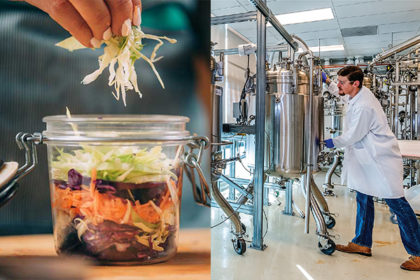
Fermentation is motivating scientists to listen to gastronomers, a rare occurrence in the field of science.
“There’s going to be a huge exchange in this two-way road that we’re living in. Innovation in flavor coming from gastronomy and innovation coming from a high-level biotechnology, they are going to be harmonious,” says Jason White, director of the fermentation lab at Noma in Copenhagen. “We’re going to be able to create this infrastructure and community of people who have the same goal, and the same goal is going to be the wellness of our planet.”
White spoke at the 2nd international Food Innovation Conference. This annual gathering of industry experts is produced by the Gottlieb Duttweiler Institute (GDI), Switzerland’s oldest independent think tank, which researches the future of food, retail and health.
The conference focused on the future of fermented alternative proteins. Or, as GDI puts it: “how innovation can solve the carnivore conundrum.” Speakers included the founders of numerous precision fermentation companies, such as SuperBrewed Food, Bosque Foods, Melt&Marble and WNWN Food Labs.
“We do the same thing, we just have different outputs”
Fermentation for alternative proteins is a divisive topic among traditional fermenters. Many say it’s lab-created fake food. Advocates, though, argue precision fermentation using DNA from mammals (as with Impossible Foods’ heme protein burger) and biomass fermentation of fast-growing, naturally-occurring organisms(e.g., Nature’s Fynd fungi protein) are reducing the risk of a global food crisis. Meat consumption is increasing, but animal meat is environmentally inefficient to raise. The significant amounts of agricultural land, fertilizer, pesticide and hormones needed to raise animals for meat protein release harmful carbon emissions.
The chefs on GDI’s “Fermentation: A World Within Gastronomy” panel spoke favorably of using fermentation for alt foods. White was joined by Ezio Bertorelli, co-founder of fermentation shop Meta Copenhagen, and Sirkka Hammer, founder of food manufacturer Wiener Miso in Austria.
“I think that it’s important for us not to steer too far away from the origins of fermentation,” White notes. But, “whether you have this bioreactor filled with whatever working inside of a laboratory with a team of scientists, we are still creating something that comes from microorganisms and from organisms. And so we do the same thing, we just have different outputs, different audiences.”
Precision fermentation technology is rooted in traditional fermentation, he notes. You need to understand the abilities of microbes and composition of ingredients for a successful precision fermentation.
“Inside of these laboratories and restaurants, there’s so many things that are being discovered that stop at the guest experience,” White says of fermentation. Today, as fermentation continues a revitalization as a kitchen craft, it’s utilized by more people rather than just chefs and scientists.
DIscovering Fermentation
Hammer highlighted the boom in home fermentation, with people creating the bold flavors of fermented foods and beverages on their own countertops.
“There’s a certain magic in fermentation. That’s why you’re gripped with it,” she says. “People are bringing a little bit of that magic, uncontrollable magic maybe [into their homes].”
At Wiener Miso, Hammer launched the company’s umami-driven ferments after living in Asia for more than a decade. The spices, pastes and sauces she makes are based on traditional Japanese ferments.
“Fermenting gives you in gastronomy next level or an add-on of flavors and textures,” she says. “Fermentation really changes the texture in a different way than if you cook it or freeze it. It gives it new dimensions.”
Flavor is what introduced Bertorelli to fermentation, too. His background is in professional cooking – he is the former executive chef of La Petite Table in Paris – but he was always experimenting with miso and sauerkraut in his home kitchen.
Even today, his fermentation experiments “go terribly wrong most of the time,” says Bertorelli. Only about 5% are successes, “that’s what makes it exciting.”
“Fermentation really changed my life because it showed me most of the dishes I was passionate about, the origin of the flavor, was the fermented part,” he says. “Flavor is universal… If you have that mind-blowing moment, it can reconnect you with things that are inside all of us, like our ancestors have been eating these foods since thousands of years ago and it’s sort of like going back in time while still being here.”
